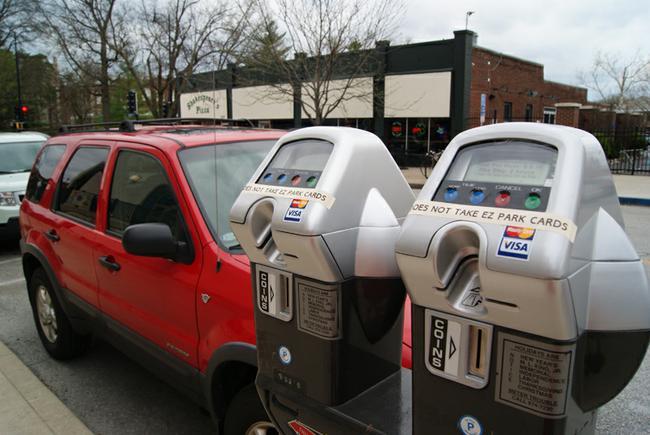
After 35 days of testing with multi-space parking meters between Broadway and Locust Streets, the first test with multi-space parking meters has received a few both positive and negative comments.
Columbia Public Works Department spokeswoman Jill Stedem said in an email that visitors to the downtown area generally like paying by credit and debit cards or cell phone but dislike walking to the machines to pay the meter.
Now with some feedback on multi-space parking meters, 40 single-space parking meters from IPS Group Inc. were installed March 13 on Ninth Street, the busiest street in Columbia.
Initially, both single- and multi-space parking meters were planned to be tested at the same time, however, IPS had a staff turnover, which postponed them coming to Columbia to install the 40 single-space parking meters.
The main difference between single and multi-space parking meters is their payment options. Single-space parking meters do not accept payment by the city’s EZ Park Card and debit card, whereas multi-space parking meters accept payment by credit and debit card, the city’s EZ Park Card, cell phone and coins.
This is because the single-space parking meters belong to IPS Group, which is a competitor of the company that provides the EZ Park cards for city. The IPS Group does not make single-space parking meter compatible with EZ Park Card.
Debit cards can’t be used for single-space parking meters because they do not have a keypad to allow citizens to enter a pin number, Stedem said.
Whether it is intended or not, Stedem said the city decided to test two different types of payment machines to see if paying by credit cards, debit cards, and cell phones was enough of a benefit to warrant investing in new machines throughout downtown.
However, since this is solely intended for testing, Stedem said if this new parking meter policy gets passed, the city will make single-space parking meters with the same payment options as the multi-space meters.
Having experienced about 35 days with multi-space parking meters and a week with single-space parking meters, some MU students have said they prefer to use single-space parking meters due to their shorter distance from the spots.
Junior JooYeon Im said she prefers using single-space parking meters because she wouldn’t have to walk to pay for her parking spot.
“It is more convenient paying with credit card so I don’t have to carry lots of quarters with me,” she said.
The decision on whether to keep this new parking meter policy after its test period is dependent on the Parking Task Force and City Council. After the test is complete, they will review the results.
The review will be based on which type of machine will generate more revenue for the city while making it more convenient for customers and helping them avoid parking tickets, Stedem said.
“If City Council decides to install either of these types of payment machines in the downtown area, it will be some time before that happens as staff would have to budget for new machines,” she said. “It could be part of the fiscal year 2013 process, but that all depends on the outcome of both the task force and City Council in the coming months.”